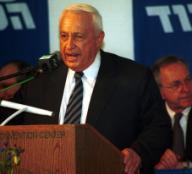Sharon's Role in Lebanon Massacre Returns to Haunt Him 20 Years Later
|
|
JERUSALEM, June 2001 (AFP) - Israeli Prime Minister Ariel Sharon's dark past returned to haunt him this week as a controversial British documentary revisited his role in the massacre of Palestinian refugees in Lebanon two decades ago and a survivor sought to bring war crime charges against him.
In a courtroom thousands of miles away from the scene of her ordeal, Suad Srur el-Marai relived her terror when Lebanese Christian militiamen went on the rampage in the Sabra and Shatilla refugee camps during the Israeli invasion of Lebanon in 1982.
El Marai, who was raped and left paralysed in the attack on her family, is one of a group of survivors seeking to press charges in a Brussels court against Sharon for crimes against humanity.
"We heard someone knock at the door. My father asked 'Who is it?' And they said, 'We're Israelis and we want to search the house.' My father opened the door and there were 13 armed soldiers," Srur said in a statement to reporters at the court.
"Afterwards they started firing at us. My little sister was shot in the head, and my father was hit in the chest but he was still alive ... But me, I was paralysed right away and I could no longer move," she continued.
| US says war crimes allegations against Sharon won't affect Bush meeting WASHINGTON (AFP) - The recent resurfacing of war crimes allegations against Israeli Prime Minister Ariel Sharon will not affect his treatment on a visit to the United States next week, Secretary of State Colin Powell said Thursday. Powell said Sharon, who is due to meet with President George W. Bush on Tuesday, would be welcomed to the White House as the democratically elected leader of a sovereign country and added that he had not seen last week's BBC television program that suggested Sharon be tried for alleged war crimes. "I haven't seen the documentary, it won't affect the meeting," Powell told reporters at the State Department after meeting with Egyptian Foreign Minister Ahmed Maher. Sharon "will be received as the elected prime minister of Israel and that's the capacity in which I speak with him almost every day," Powell said. En route to the United States this weekend, Sharon is to stop in Britain but unusually is not expected to meet with Prime Minister Tony Blair. An official in Sharon's Likud party suggested the Blair might have declined the meeting after the BBC aired its program which investigated events that occured during Israel's invasion of Lebanon while Sharon was defense minister. The program suggested that Sharon should be tried for his role in the 1982 massacres at the Sabra and Shatila Palestinian refugee camps. |
"They raped me, one after the other, right in front of my father. They shot at me -- I was hit on the left hand -- and then they left.
"They came back later that night and were furious to see I was still alive ... they shot me twice more," said Srur, now 36, who walks with two canes and still has nightmares about the incident.
The complaint hinges on a 1993 law that makes it possible for Belgian courts to try cases of genocide and other crimes against humanity that took place in foreign countries.
Sharon, a hawkish former general known as the "Bulldozer," was declared unfit to be defence minister after an Israeli commission of inquiry in 1983 found him indirectly responsible for the killings during the invasion he orchestrated.
His career was blighted for years by the scandal, and his landslide win in the February election in Israel over Labour prime minister Ehud Barak had seemed all but impossible only weeks beforehand.
But Sharon has never apologised for his role. And his government slammed a BBC "Panorama" documentary, which ran Sunday, for suggesting Sharon should be indicted for the massacre.
"Israel takes a grave view of the slanted and unfair nature of the Panorama programme," the foreign ministry said in a statement. "The timing of the programme, 19 years after the events ... constitutes an attempt to sully the name of Israel and its leader by any means."
On the programme, former International War Crimes Tribunal chief prosecutor Judge Richard Goldstone said Sharon, now 73, should be held responsible for the massacre.
"In the case of Sabra and Shatilla, clearly the Kahan Commission found that very serious crimes had been committed and I have no doubt that any decent person would regret the fact that not a single criminal prosecution followed," Goldstone told the BBC programme, entitled "The Accused".
Richard Falk, professor of international law at Princeton University, said of Sharon: "There is no question in my mind that he is indictable for the knowledge he had or should have had."
In a statement, the BBC said it stood by the story, which it called "a legitimate analysis of a human rights issue."
In January, just a month before his election, Sharon expressed his regrets for what he said was a "terrible tragedy," but refused to apologise.
"To apologise for what?" Sharon told Arab Israeli weekly newspaper Kul-al-Arab.






